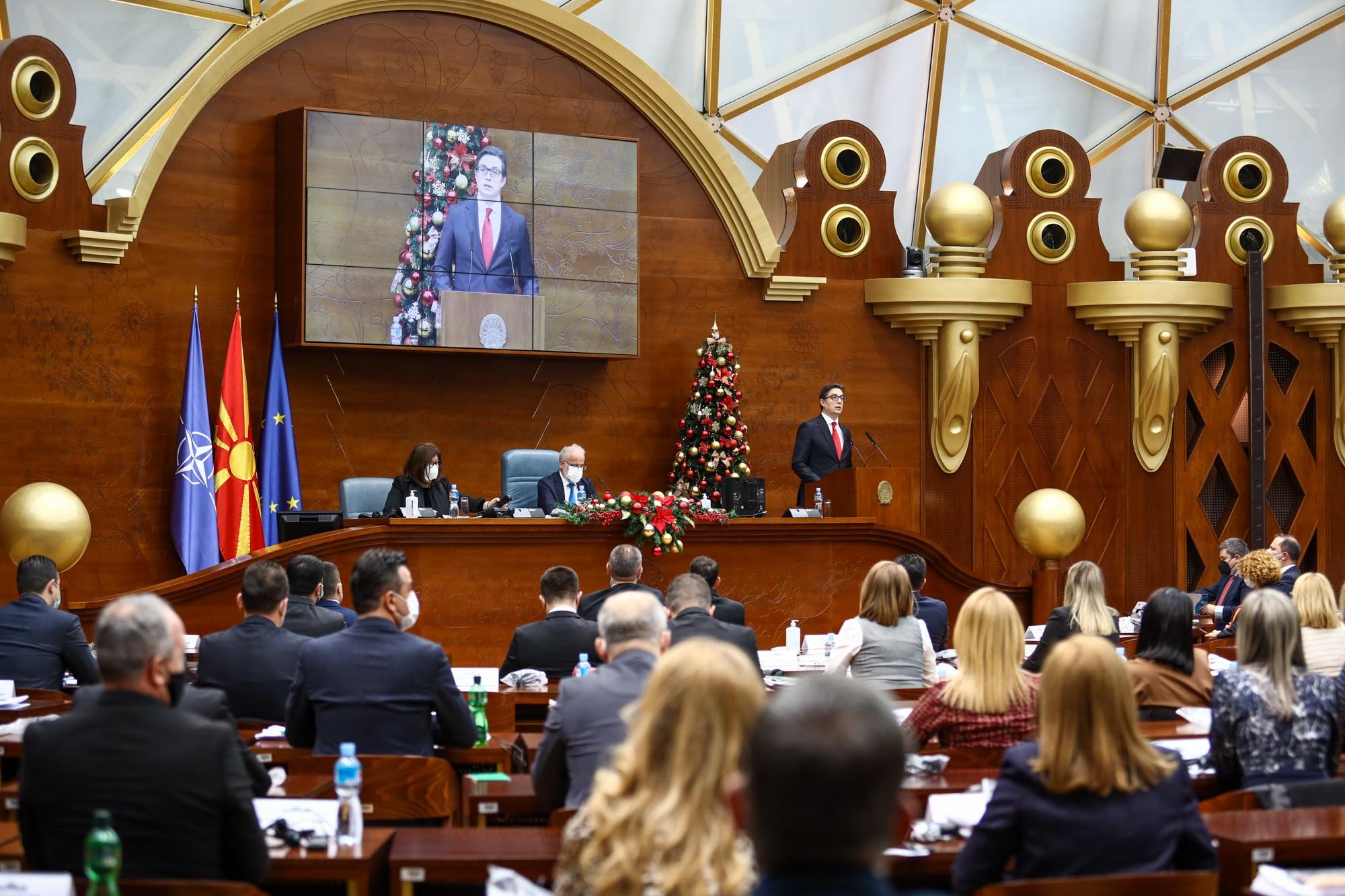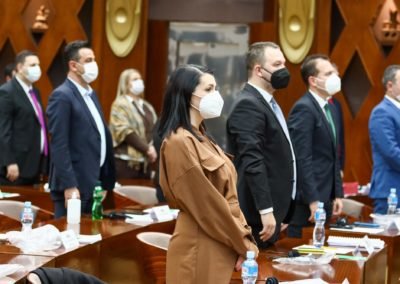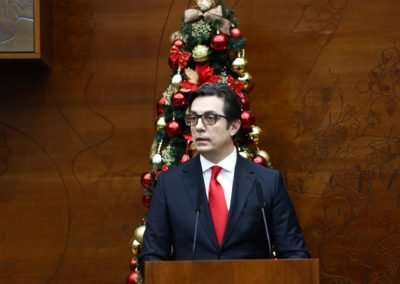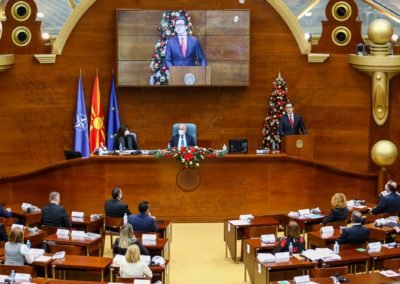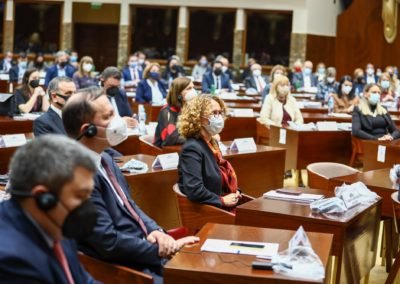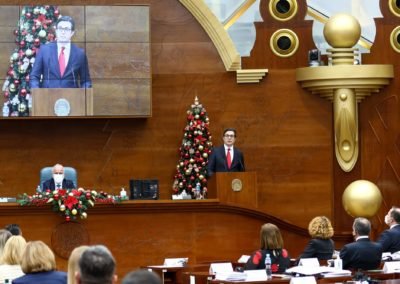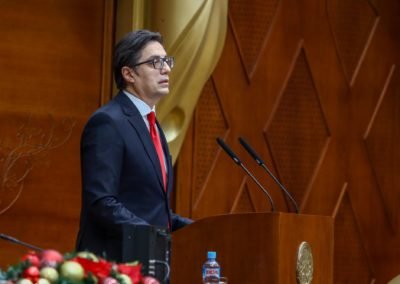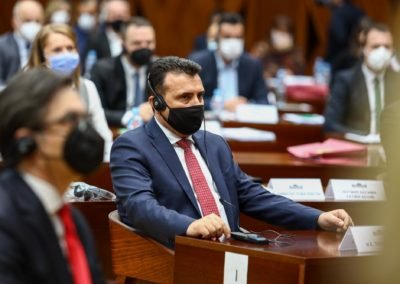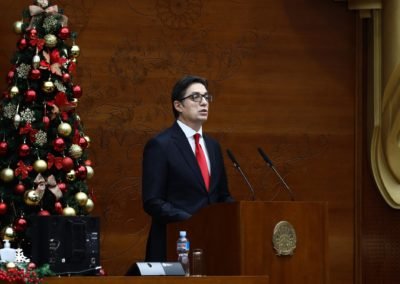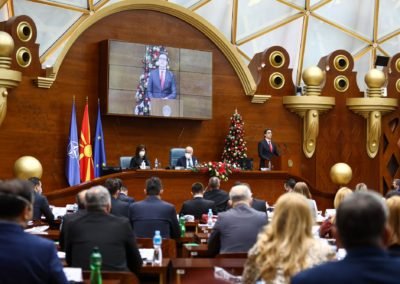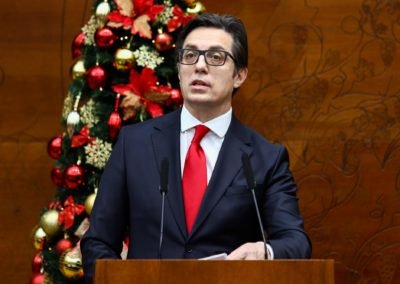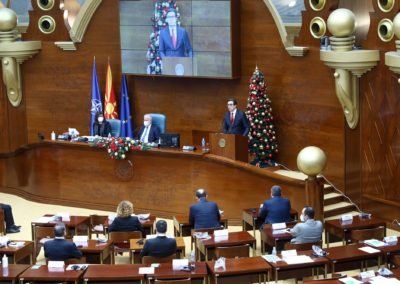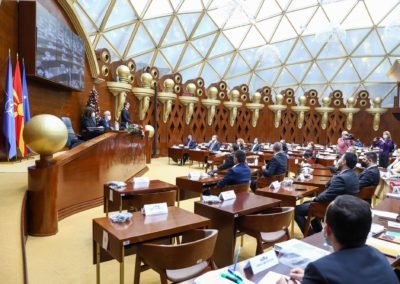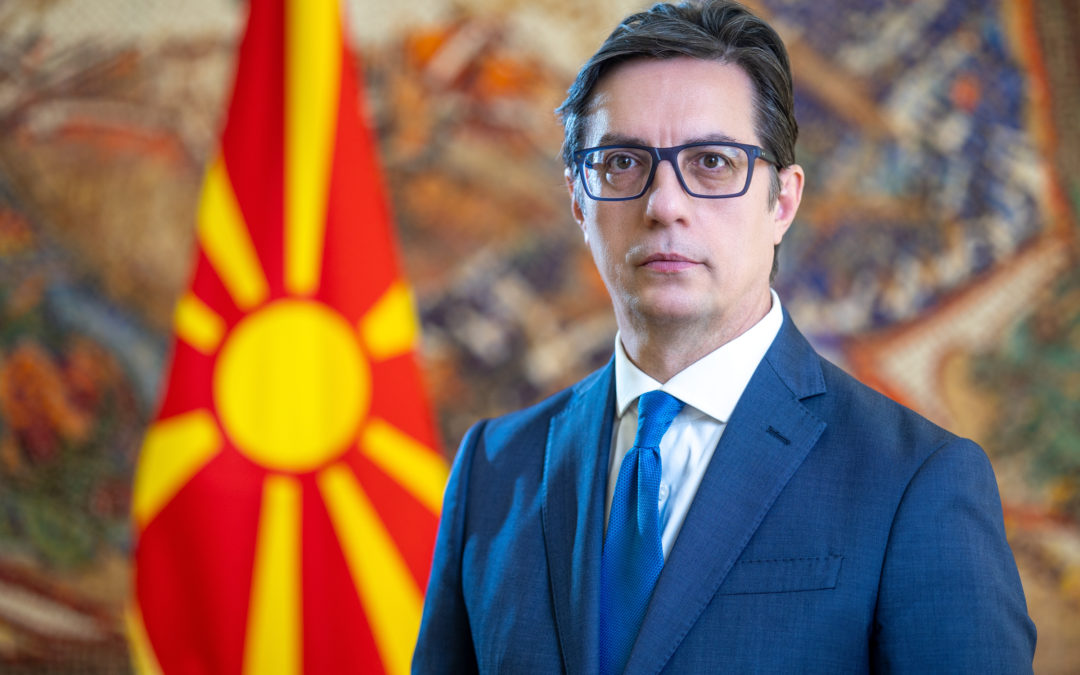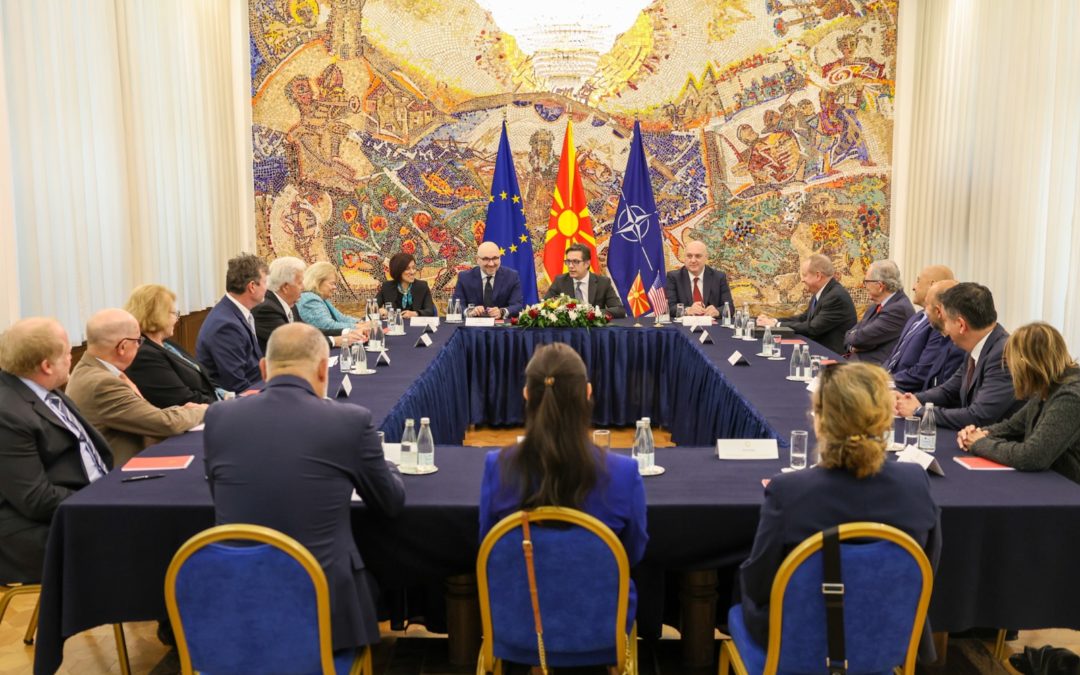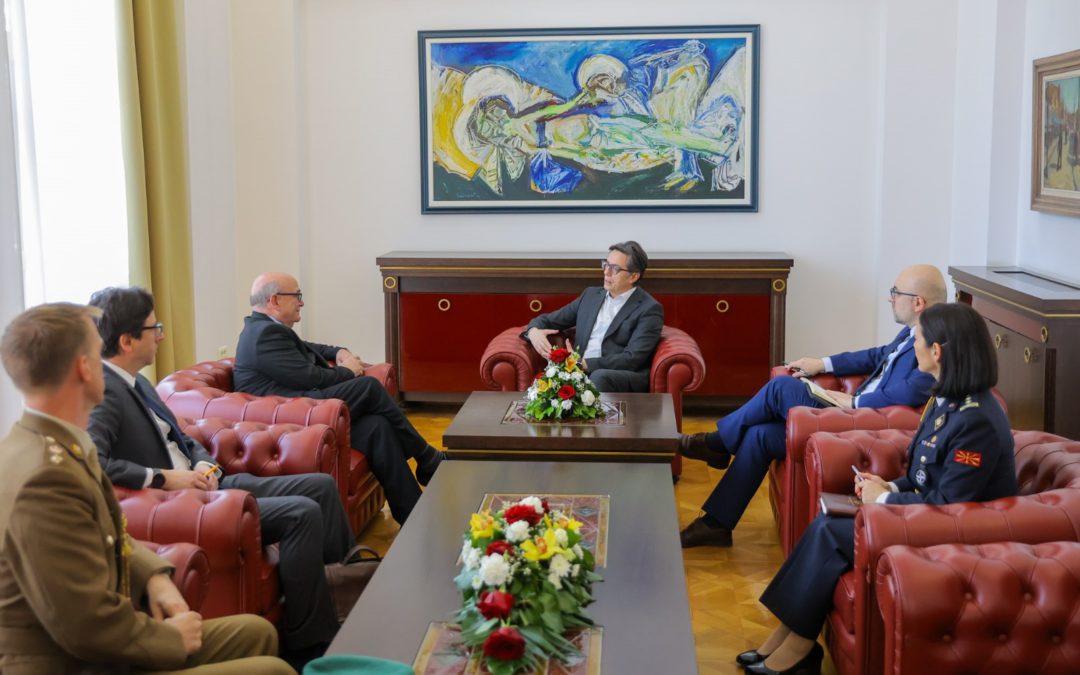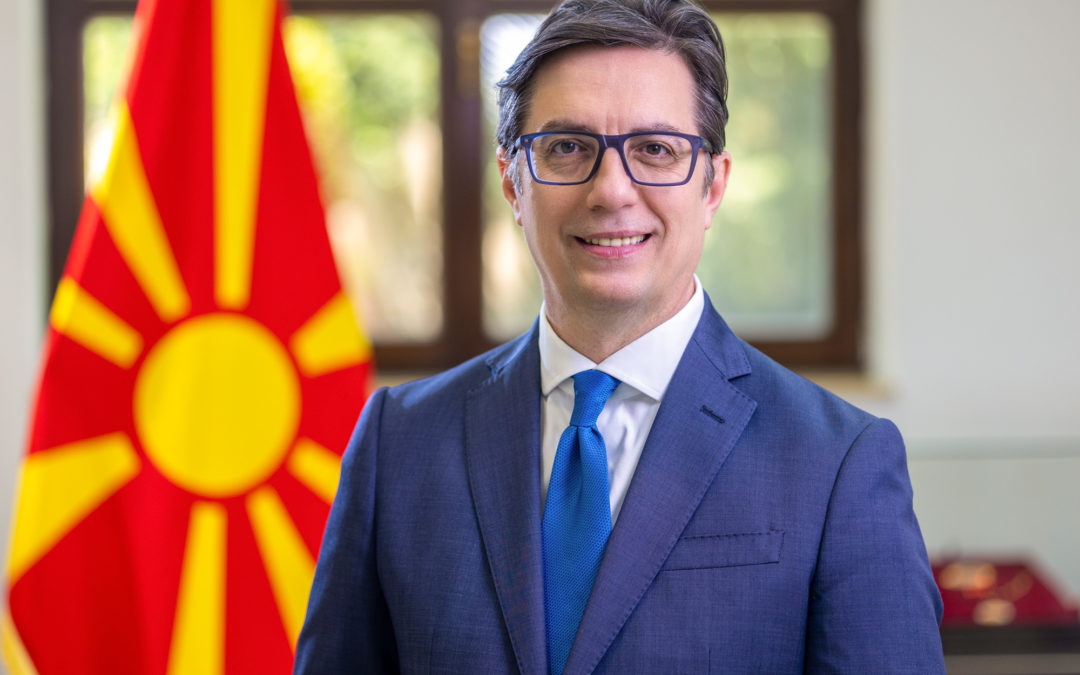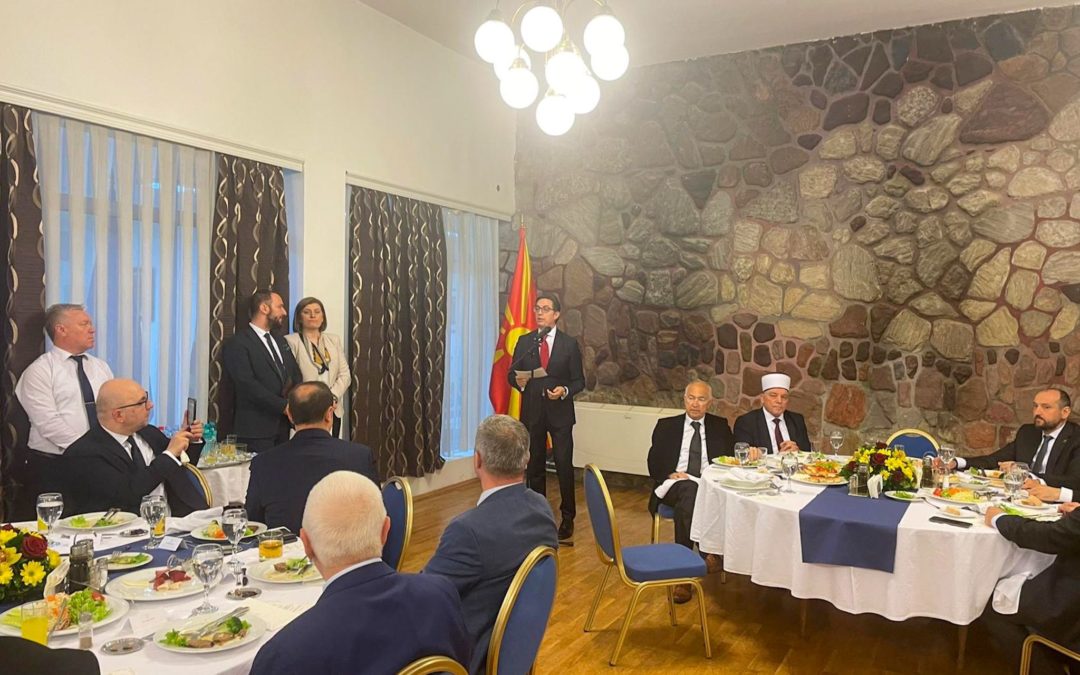Respected citizens, Distinguished President of the Assembly,
Distinguished Prime Minister, Distinguished Members of Parliament, Distinguished Ministers, Esteemed Guests,
Your Excellencies, Media Representatives,
At the very beginning, let me express my condolences to the families of all those who lost their lives as a consequence of the Covid-19 pandemic and ask all present in the hall to pay one minute’s silence in respect for our 2169 fellow citizens who, unfortunately, died of the virus. May they rest in peace!
I would like to extend my gratitude to the doctors, the medical staff and all the citizens who were and still are on the front line in the fight against the pandemic. They are the real heroes of this 2020 which has unexpectedly turned into one of the most difficult years since our independence; they, on a daily basis show in action that humanity and solidarity are not forgotten categories and that the decades of hard living and years of difficult transition have not dehumanized us to forget the sufferings of others.
Ladies and Gentlemen,
The pandemic was supposed to be a moment of sobriety for everyone in the country and lead to unification of the nation that is facing an unknown adversary, regardless of the perfectly legitimate political, ethnic and human differences between us. In one part it has achieved this, but in the other, it has unfortunately strengthened the existing antagonisms, widened the divisions in society and exposed institutional weaknesses, which, in addition to the health and political crisis, have undermined the economy which, at the end of the year, officially entered a recession.
The country was left without a functioning Assembly for almost nine months and for the first time since our independence, a state of emergency had to be declared to enable the system to function, the economy to survive, and the Government to have wider legal space to help citizens and businesses that were hardest hit.
We all remember the painful scenes, even in some of the most powerful countries in the world, where people were waiting at the doors of hospitals in which there was no free bed. The pandemic has put enormous pressure on our health care system, but any objective analysis will show that the country, in general, has managed the situation with the pandemic in a rational way by systematically distributing the limited resources available to us, thus avoiding a collapse that would probably mean greater number of victims and infected persons.
During the pandemic, we managed to organize parliamentary elections, in which about 940,000 people exercised their right to vote, but the massive number of voters was not the reason for the spread of the virus. The elections, which during the pandemic were one of the first organized in the world, were assessed by the OSCE/ODIHR mission as democratic and it showed that we have a capacity to organize elections and establish democratic institutions in extremely complex conditions.
I have convened the Security Council several times to agree on better coordination between the institutions and implementation of the necessary measures, and I have deployed the Army in support of the health sector and the police, both during the state of emergency and during the crisis situation declared at municipal and state level.
I know that such assessments will mean nothing to the families who have lost their loved ones, but the structural, decades-long decay of the health system could easily have contributed to even worse results had it not been for the day-to-day efforts of health care workers, army, police and thousands of volunteers.
The first and most important task for us as a state, immediately after putting the pandemic under control is to make an in-depth analysis of the functioning of our legal, political and economic order in the past year, to learn lessons and put on a sound footing all parts of the system that failed, because no one knows whether a new pandemic is awaiting us on the next curve of history.
In this context, in the part of my competencies, at the outset of the next year I will initiate a public debate that should contribute to the drafting of laws on the state of war and emergency and a legal framework for reform of the entire crisis management system. At the same time, our only goal should be to further define the legal basis for better coordination between institutions in times of crisis, greater transparency in their work and better control mechanisms as a barrier against possible abuses by the government.
However, there is something that cannot be regulated by any law and no decree or rulebook helps. The restriction of human rights and freedoms, and especially the restriction of movement and social contacts between people, which was a coercive measure, had a significant negative psychological effect on citizens. I have a feeling that in such conditions, when our primary task was to fight the virus, not only here and not only we, we paid insufficient attention to the vulnerability of citizens to propaganda, misinformation and false news in this special social situation.
Dealing with the health crisis is a serious challenge, but avoiding the long-term negative consequences of citizens’ distrust of institutions, but also of science and profession, which intensified during the pandemic, is not a smaller challenge. What surely awaits us is a new wave of negative campaigns that will discourage people from getting vaccinated by spreading conspiracy theories on social media. Therefore, the vaccination campaign, which will of course be on a voluntary basis, will have to be run through personal examples. We must not allow, in the 21st century, for such serious issues, semi-literate charlatans and quack doctors to dominate the biggest scientific names and institutes that in the past two centuries, from the appearance of the first vaccines, have saved millions of lives.
Ladies and Gentlemen,
This 2020, we became a full member of the NATO Alliance. This year, on February 11, when we ratified the Accession Protocol, at the session of the Assembly, I said:
“In the past years, unfortunately, there were very few issues on which we reached a full state consensus, and when I talk about that, I do not mean only consensus among political elites or parties. I mean a consensus that unites all citizens, regardless of their differences in nationality, religion or language. Without pretending to sound pathetic, I believe that today’s decision to ratify the North Atlantic Treaty is a big step in completing the Macedonian statehood and stamping our territorial integrity and sovereignty. The honor to make this historic decision was given to us, the representatives of citizens in the legislative and executive branches. Now it is the responsibility of our generation: to show the world that when one believes in the same values, there are no differences between small and big countries.”
Even today I reiterate the qualifications said because I am aware of the historical proportions of what has been achieved. However, this does not mean that all problems are behind us and that there are no new challenges posed by modern times. Hybrid threats, cyber threats and fake news were present even during the pandemic, and will be present in the future, too. But for the first time in our history we are not alone in fighting old and new threats. We are joined by 29 democracies and 29 armies as our allies.
In the context of our obligations related to NATO membership, on this occasion, I would like to point out one aspect, which has not been debated in public so far, an obligation that is extremely important and which is, de facto, the first vetting of the highest political, security, defense and intelligence echelons of government. Until now, all officials dealing with classified information needed the so-called national certificate to access them, but, as of March this year, a NATO certificate of access to classified information is required, which means that, except for us, all member states of the Alliance must confirm that one official is clean on two grounds: first, contacts with countries, entities and individuals who treat NATO as their opponent, second, involvement in cases of high corruption where there is a possibility of being abused by malignant countries, individuals and entities.
It is a very complex and rigorous process that is underway and which, in the cases of previous admissions of NATO countries, on average, distanced from confidential information from 10 to 15% of senior military, police and political figures. The first phase of that process is coming to an end, I hope that finally we will come up with a much smaller percentage of rejected officials; however, each of us must be aware that membership in the Alliance means a personal example and a real, not only rhetorical support of the values on which that organization rests.
Distinguished Members of Parliament,
Last year, in an interview, I said that if the price to enter the European Union is to give up identity and language, then there is no living Macedonian who will agree to such a condition. For that stance, I was criticized by some circles who said that it was wrong and that we should do everything to enter the Union, regardless of the price. Then and now, I am convinced that membership in any international organization is not valuable if you are asked to deprive yourself of your identity. There is no need to call a referendum on such a proposal – because the outcome will be known in advance. We were not negotiating for 25 years with the Hellenic Republic only for the addition to the name, but, above all, for international confirmation from the whole world, through the United Nations, about who we are and what we are. In the end, we made a compromise only because, both in the Greek Parliament and in the United Nations, it was ratified and confirmed that we are Macedonians who speak Macedonian language.
Last year, in my annual address to this Assembly, I said: “We are absolutely ready to face the arguments for certain historical controversies related to different interpretations of the same event or person, however, the right to identify as Macedonians who speak Macedonian has been and will be outside of any debate, because these are long overdue historical processes.”
In the past year, in the context of the dispute with Bulgaria, there were proposals to convene a leadership meeting or a special session of Parliament at which we are supposed to establish our red lines in the talks with Sofia.
As for the leadership meeting, I want to say that as last year, this year too, at the request of the political parties, several such meetings were held under my leadership; my position is that such a non-institutional format of meetings, in principle, should be abandoned, because leadership meetings are, in essence, a substitute for institutions when they do not have full legality and legitimacy, which is not the case here. Regarding the convening of a special session of the Parliament, although it is the competence of this house, I also do not see the need for such a thing, because no parliamentary political entity disputes the identity of the Macedonian people and language. For me, it is not serious in 2020 to gather all relevant political parties and politicians and solemnly sign that we are Macedonians who speak Macedonian language!?
I am deeply convinced that none of today’s generation of politicians has the right to agree upon or negotiate on these issues, both today and in the future, because our red lines have long been established by those who founded this country in 1944 with the state-founding acts at the First Session of ASNOM: The Manifesto to the Macedonian People and Document No. 8 on the Introduction of the Macedonian Language as an Official Language in the Macedonian State.
Regarding the views on this issue of the largest political parties, I have said before, I will repeat today: they have a completely identical position regarding our identity and differ only in terms of the methodology aimed to reach the goal. I am saying this from my personal experience: from among the entire Macedonian political leadership, both in the government and in the opposition, I do not know anyone who is ready to trade with the most sacred things for every Macedonian. Hence, I suggest that we should remove this issue from the daily political agenda and not waste energy on it.
Allow me to add to the same question or to express my position regarding the behavior of the political representatives of our fellow Albanians and their attitude towards the issues that affect the Macedonian identity. Unfortunately, one part of the ethnic Macedonians have had doubts for many years: do Albanian politicians support our struggle for wider international affirmation? I claim responsibly, because I have witnessed these processes for more than 20 years, since we negotiated with Greece in the 1990s, that the Albanian political factor, both when it was in power and in opposition, all these years had extremely correct behavior and understanding of our efforts to preserve and promote the Macedonian identity. Such an attitude helped us be stronger in all meetings with foreign emissaries because we knew that we had a harmonized state position. In fact, it cannot be otherwise because North Macedonia is a common house for all of us, in which there is no division of tenants and landlords.
Finally, despite the Bulgarian veto, no one should have any dilemma: North Macedonia will continue towards the European Union, because we are convinced that only through the processes of Europeanization can we become a real and prosperous democracy in a relatively short period of time. The European Union is far from perfect; national interests often paralyze it; the attractiveness of its model and pre-accession funds are not at the level they were 15 or 20 years ago, but it is still an indispensable tool for democratization, and its values inspire millions of people worldwide. Moreover, we will not accept any backup option, and we will participate in all regional and continental initiatives only if they are complementary, and do not represent a substitute for membership in the Union.
The alternative to this European path is to vegetate on a low standard of living instead of living the life, to lose energy in historical disputes, to become suffocated in nationalisms, to open up room for authoritarian tendencies and to count young people leaving. I know that a huge number of our citizens would not like to see such a development.
Distinguished Members of Parliament,
The draft law on the census is in parliamentary procedure which for a long time has attracted diametrically opposed views, because in our country, despite all the appeals for a reasonable approach, unfortunately, the census is not perceived as a statistical, but as a classic political operation. On this occasion, I would like to appeal to the government to incorporate in the text all the highest statistical standards of Eurostat and all constructive proposals of the opposition in order to obtain valid results whose credibility will not be disputed by anyone.
I am convinced that the high political tensions over this strategically important undertaking for the state would be greatly reduced if all political entities publicly explain the goal they expect to be achieved with the adoption of the law: whether obtaining accurate statistics on which basis we will be able to formulate long-term policies and strategies in vital areas or politicizing census results to defy the status of ethnic communities.
I have expressed my view on this issue many times and I have no problem expressing it publicly today again: there is no country in the world that has progressed by curtailing the rights of its citizens or by questioning their legal and political status. We made such a mistake in the 80s of the last century and it resulted in interethnic tensions that drastically reduced the cohesion in the society and its resilience to crises.
Ladies and Gentlemen,
Whether we will finally establish the rule of law on sound foundations is not a matter of technical reform of any of the judicial institutions. It is an existential issue for the survival of our country. Economic development, democracy, and, finally, migration depend on the rule of law directly. Young and capable people do not leave their country only for the sake of bare survival, but often because of the (low) quality of life. Justice is indeed one of the key aspects of quality of life. Everyone wants to live in an organized society and in a country with a predictable future.
After years spent in monitoring and analyzing catastrophic demographic indicators, we need to understand that migration is one of the biggest threats to our national security. The solution, in my opinion, is to immediately adopt a strategy for dealing with this huge problem with a supra-party consensus. For this, all parties and politicians have identical position because our youth is moving out, regardless of ethnicity. The minds, energy and creativity of whole generations that have a huge potential to make their country a decent place to live are irreversibly gone.
After the case in which the front person of the former SPPO was involved, citizens seem to have lost even more hope that justice and fight against corruption are possible. It is our obligation as politicians, not to anyone else but to the citizens, to return that hope that justice is achievable and that there are no untouchables.
The Government has set the fight against organized crime and corruption as its highest priority and that is to be praised. However, the Government should also be aware that the success in that fight will be at the same time the key indicator, according to which, not Brussels, but our citizens will appreciate whether it will justify the mandate it won in the elections on July 15th.
Ladies and Gentlemen,
We do not need dialogue on historical issues from ancient times or 19th century, nor on who we are and what language we speak. We need national consensus for a comprehensive digitization of society, for renewable energy sources, a modern agricultural sector, a modernized health system, a 21st century education.
From the First Industrial Revolution until today, there is one constant in the development of states: the application of technological innovation is the main factor for progress of societies. The world is at the beginning of the fourth industrial revolution, where Education 4.0 is the key component.
North Macedonia must be transformed into a startup country, a country where innovations and new technologies are supported and promoted through opening of incubators and technological parks. All of this requires structural changes in our education system that should prepare students to solve problems instead of memorizing ready-made solutions, as is unfortunately the case today in many schools.
In the course of this year, I tried, at every possible opportunity, to maintain the dialogue with the political parties, NGOs, trade unions, individuals from all over the country who either had a problem or wanted to present their idea to the institutions. Unfortunately, I was not always successful in fostering dialogue because sometimes there were political prejudices on the other side instead of will to talk. But, regardless of that, I will remain consistent with my basic principle in politics and in life that for all issues and problems solutions should be sought through dialogue and respect for everyone.
In the coming period, I will continue to talk with human and labor rights associations, with those who are marginalized and vulnerable, with those whose voice often does not reach us, because the struggle for a dignified life and for a just and a society of solidarity must never stop.
Distinguished citizens, esteemed MPs, respected public,
Last year, as a nation, we went through the greatest Golgotha that even our oldest citizens do not remember. We paid a huge price, over 2,100 of our fellow citizens lost their lives, many families are left in sorrow forever. Congratulating you all on the upcoming holidays, I want, not only as President, but as one of you, to ask you to celebrate them at home with your loved ones in order to preserve the most precious thing we have – health and life. Since we have endured a whole year, with masks, quarantine, isolation and limited movement, please, may we endure another month or so before we begin to return to normal! There will be time for going and hanging out and chatting with friends and comrades. But, we have lost too many people to afford new human and family tragedies.
I wish you and your loved ones good health in 2021. If we keep the most valuable thing – health, for all other problems and hard times that life always brings along, we will look for solutions and help each other.
May you all be safe and sound and may our common state – the Republic of North Macedonia – be eternal!
Thank you!
